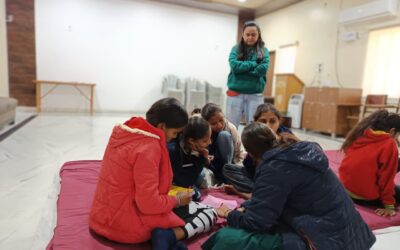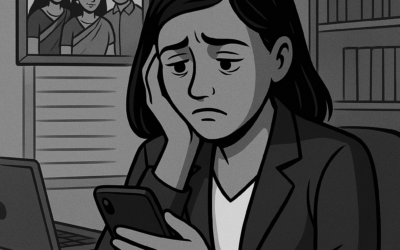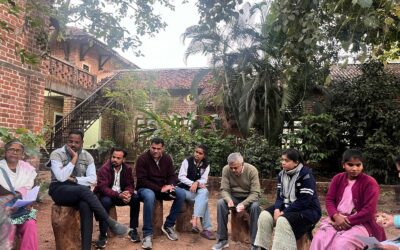In the midst of wrestling with the usual monthly report, a summon from my regional manager threw a wrench in the gears, pulling my colleague and me into an unscheduled meeting. We gathered. With careful clarity, the manager laid out the situation: we had to go to a two-day training workshop focused on land restoration, taking place in the Sidhi district, a good 165km away from my host organization Chaitanya’s Umaria office in Madhya Pradesh. The organizers were firm about the need for at least two people from our office to be there for the whole event.
At first, my brain went straight to the idea that my manager and colleague would handle this task. With my forestry background and past experiences with similar events, I had figured the workshop would mostly cover land restoration and government policies, topics that weren’t exactly my strong suit. I imagined my teammates might even jump at the chance to save me from the hassle of traveling and getting everything arranged, happily volunteering to represent our team in Sidhi.
Unexpected Turn Of Event
My manager shared that he couldn’t make it to the second day of the workshop because of a personal holiday. This news meant I had to rethink my assumptions, realizing I would be going to the workshop with my colleague. After thinking it over, I shared my agreement, confirming that I was on board with attending the workshop and looking forward to growing my knowledge of land restoration methods.
This unexpected turn of events sparked a mix of emotions within me. While I initially felt a sense of relief at the prospect of avoiding the workshop, the realization that my manager couldn’t attend forced me to confront my own preconceived notions and biases. I had subconsciously relegated myself to the sidelines, assuming that my skills and expertise were not directly relevant to the workshop’s core themes. However, the manager’s announcement served as a wake-up call, reminding me of the importance of embracing new challenges and expanding my horizons beyond my comfort zone.
As I mentally prepared for the workshop, I couldn’t help but wonder what lay ahead. Would the content be as dry and technical as I had feared, or would there be opportunities to engage with the material in a meaningful way? Would I be able to contribute my own perspectives and insights, or would I simply be going through the motions? These questions swirled in my mind, fueling a sense of both apprehension and excitement.
A Surprising Welcome
Upon arriving at the resort, the workshop venue, we were greeted with garlands by the resort staff. The resort manager, with a polished smile, directed an attendant to take care of “Sneha ma’am’s luggage”. I was taken aback, as I hadn’t yet shared my name. While she likely had a participant list, she couldn’t have known my face. When I inquired how she knew my name, she explained that I was the only woman participating in the entire workshop, and the organizers had specifically requested that she take extra care of me. This revelation was quite a surprise – I was the sole female representative in the entire training.
Over coffee the next morning, I discussed gender skewness with my regional manager. I asked if this imbalance was typical in other training programs. He suggested that there are very few women working directly in this field and that they usually prefer office jobs to field work. He noted that women tend to be more involved in areas like gender equality, SHG Federation work, and healthcare, which he felt were more aligned with their preferences.
Addressing The Issue With Organizers And Participants
At the workshop’s conclusion, the organizers solicited feedback. I directly questioned the lack of female representation, asking if organizations had been encouraged to include women. The organizers responded that they hadn’t set any gender quotas; organizations were free to send whoever they wished, regardless of gender. When I inquired if this had happened before, they admitted that gender skewness was common in training, even though their office had more women than men. However, this was the first instance of a training with only one woman.
I then posed the question to the other participants, many of whom had extensive experience in the sector:
“Why were there so few women in these training programs?” One participant bluntly stated that the position I held was essentially a man’s job. While women might be found in higher or lower positions, the technical nature of this particular role seemingly discouraged female participation.
Some suggested that women dislike traveling for training, while others claimed that land restoration and agroforestry are male-dominated, technically challenging fields that don’t attract women. Some participants stated women are more present in fields related to healthcare, education, or SHG federation work because those themes align better with women’s interests.
A Call For Change
I then asked the organizers if I could write about this situation as feedback and what actions they would take in response. They encouraged me to share my observations and assured me that the issue would be brought to the attention of higher-ups. Furthermore, they pledged to encourage greater female participation in future training programs. I felt happy that I could bring about this small change.
Although the training was enriching, it made me wonder why more women don’t participate in similar workshops. Was it the perception of difficulty, a lack of encouragement, or other underlying factors? What is stopping them to not attend such good and enriching training workshops?
The training workshop’s content wasn’t as challenging as I had anticipated, and I understood the concepts without difficulty. This prompted me to reconsider whether the perceived complexity truly deters women or if other elements contribute to the gender imbalance. It became clear that direct engagement with women was essential to uncover the underlying reasons preventing their participation in valuable training workshops like these. What obstacles do they face, and how can these be addressed to foster greater inclusivity in the field?




0 Comments